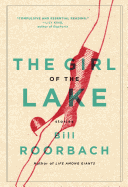
| Publisher: | Algonquin | |
| Genre: | Short Stories (single author), Literary, Fiction | |
| ISBN: | 9781616203320 | |
| Pub Date: | June 2017 | |
| Price: | $16.95 |
| Fiction |
by Bill Roorbach
The drawback to Bill Roorbach's (The Remedy for Love) story collection is that each of the nine feels like it should keep going. Not that the tales in The Girl of the Lake are incomplete; they're so engaging that, as carefully crafted stories do, they create a world inviting the reader to stay a while.
Settings span the globe. In "The Fall," Jean and Timothy take a remote Maine trail for a camping trip as doomed as their relationship. Robert and Phillippe (not a couple!) snag a complimentary Mediterranean vacation in "Princesa," where they meet fellow international revelers and open themselves to new experiences. Recently widowed Miller Malloy volunteers with over-the-top enthusiasm at the floundering New Hampshire summer theater his wife supported in "The Tragedie of King Lear." And a summer fellowship at Oxford resonates decades later when a roommate becomes king of an unnamed African country in "Dung Beetle."
Roorbach, who lives in Maine, reveals a naturalist's affection for the earth, and his stories are hopeful. When the Michigan farmer in "Some Should" leaves her sheep and organic crops to meet an Episcopal priest for a blind date in Ann Arbor, her reluctant enthusiasm is rewarded. In the titular final story, a 17-year-old boy is the last cousin to spend the summer with Grandma in the New Hampshire cottage on land shepherded by generations of his family. The story brims with an optimism sure to leave the reader feeling upbeat. --Cheryl Krocker McKeon, manager, Book Passage, San Francisco
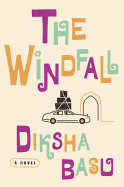
| Publisher: | Crown | |
| Genre: | Contemporary Women, Cultural Heritage, Family Life, Literary, Fiction | |
| ISBN: | 9780451498915 | |
| Pub Date: | June 2017 | |
| Price: | $26 |
| Fiction |
by Diksha Basu
New Delhi native Diksha Basu's first novel, The Windfall, is a comedy of manners that riffs on the universal theme of keeping up with the neighbors.
When Mr. Anil Jha sells his website for a vast sum of money, he and his wife, Bindu, decide to leave their longtime home of Mayur Palli in East Delhi for a beautiful two-story house in Gurgaon, a swank district on the other side of the city. Mr. Jha happily greets the dawn of a new era--one filled with the right people, couches dotted with Swarovski crystals and the possibility of a swimming pool. Mrs. Jha, on the other hand, clings to a simpler life, worrying that the new house's showers aren't environmentally friendly and putting her foot down against installing bathtubs. Nevertheless, the Jhas attempt to build rapport with their chic and condescending neighbors the Chopras.
Meanwhile, in New York, their son Rupak is concerned that he will let his parents down when they find out he's failing his business classes at Ithaca College. Worse, he hasn't told them about Elizabeth, his white American girlfriend.
Though occasionally frothy (particularly in scenarios featuring Mr. Jha's attraction to extravagances like a shoe-polishing machine and Mr. Chopra's subsequent passive-aggressive putdowns), Basu's story also strikes serious notes. The major characters, with the possible exception of Mrs. Jha, feel great pressure to force themselves into a predestined mold rather than living as they want. While Basu spotlights the expected perils of trying to buy class, The Windfall looks warmly on the forgiving nature of strong families and friendships for an ultimately delightful outing filled with laughs. --Jaclyn Fulwood, blogger at Infinite Reads
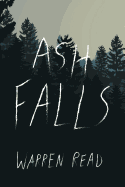
| Publisher: | Ig Publishing | |
| Genre: | Small Town & Rural, Crime, Literary, Fiction | |
| ISBN: | 9781632460479 | |
| Pub Date: | June 2017 | |
| Price: | $16.95 |
| Fiction |
by Warren Read
In the beautifully rendered opening of Warren Read's Ash Falls, Ernie Luntz escapes into the Washington mountains after an accident during a prison transport. The brilliance of Read's first novel is that Ernie's getaway acts as the opening of a window--one that provides a view of Ash Falls, the town Ernie left behind when convicted. Read provides a kaleidoscopic look into the lives of small-town denizens--including those of Ernie's ex-wife and son--altered by interpersonal histories, dysfunction and one particular moment of violence.
A series of streamlined, interconnected vignettes, the chapters examine a number of long-time residents as word of Ernie's escape spreads. The main focus is not on him, however, as each individual has a distinctive connection to the others and the events that led to Ernie's crime.
What begins as prose that dangles on the precipice of over-descriptive becomes, as Read and his readers get into the flow of the novel, a stunning display of grit made alluring. A boy running his hands over grass is "caressing the fur of a giant beast"; a rundown neighborhood is inhabited by "people pushing grocery carts where there were no grocery stores"; and a mother's disappointment in her son is gut-wrenchingly defined by the items displayed, and missing from, the front of her refrigerator. Both beautiful and stark, Ash Falls is a slice-of-life portrait that gives color to the grayest of times. --Lauren O'Brien of Malcolm Avenue Review
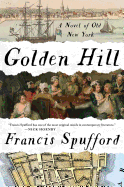
| Publisher: | Scribner | |
| Genre: | General, Literary, Fiction, Historical | |
| ISBN: | 9781501163876 | |
| Pub Date: | June 2017 | |
| Price: | $26 |
| Fiction |
by Francis Spufford
New York, located on the tip of Manhattan Island in 1746, is unsophisticated and barely populous enough to be called a city. Golden Hill: A Novel of Old New York by Francis Spufford (Red Plenty) brings the smells, sights and sounds of pre-revolutionary New York into sharp focus.
When Mr. Smith steps off a boat from London and refuses to divulge any information about himself, even while presenting a banknote for the enormous sum of £1,000, people take notice. Mr. Lovell, head of the accounting firm to whom the note is presented, is leery of this mysterious young man. "I don't know how to take you, and you study to keep me uncertain, which I don't see as a kindness." When Lovell decides to hold the note until the next boat from Britain arrives with a confirmation letter, Smith is forced to remain in New York, subsisting on little money but an abundance of charisma. Diverting his attention from financial matters is Tabitha, Lovell's mercurial daughter, and Oakeshott, secretary to New York's governor, with whom Smith develops a bond that allows him access to the private lives behind society's façade. Yet Smith has the deepest secret of all--and discovery could be catastrophic. "When he planned his entrance, he had not considered how much more easily an illusion is begun than maintained."
Spufford gives readers a rollicking story about a brash young man who becomes enmeshed in provincial turmoil that foreshadows the national conflict to come. --Cindy Pauldine, bookseller, the river's end bookstore, Oswego, N.Y.
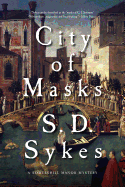
| Publisher: | Pegasus Books | |
| Genre: | Mystery & Detective, General, Fiction, Historical | |
| ISBN: | 9781681773421 | |
| Pub Date: | July 2017 | |
| Price: | $25.95 |
| Mystery & Thriller |
by S.D. Sykes
Young Oswald de Lacy, Lord Somershill, has fled his English estate, full of melancholia and flashbacks to tragedies in his life. He and his obstreperous mother are on a pilgrimage to the Holy Land when the King of Hungary blockades the Italian coast, and they become stranded in Venice.
Drawn into Venice's decadent and secretive society, but still suffering from unexplained nightmares, Oswald is at loose ends. As the weeks drag, he begins to gamble extensively--leading to an interrogation by representatives of the Doge and a massive debt to an unscrupulous man. But suddenly circumstances turn even more awry when a member of the Somershill household is murdered. Desperate to come up with some quick cash for the journey home, and to fend off his mother's interference, he undertakes the investigation in exchange for lucrative payment. Though he's played sleuth previously on his own estates, Oswald soon discovers how far a cry that was from investigating a death in this closed, enigmatic city.
From brothels to dungeons to palaces, Oswald must journey all over Venice as he tracks a killer. And along the way, he discovers that he is not the only one with matters he'd prefer to keep hidden.
Menacingly atmospheric, City of Masks captures the glamour and paranoia of medieval Venetian society. An intriguing mystery, with a fascinating background, City of Masks is the third Somershill mystery by S.D. Sykes (Plague Land, The Butcher Bird). Historical fiction readers and mystery lovers are both sure to enjoy this historically accurate, dark and entertaining novel. --Jessica Howard, bookseller at Bookmans
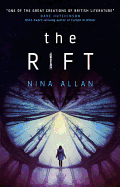
| Publisher: | Titan Books | |
| Genre: | General, Literary, Fiction, Science Fiction | |
| ISBN: | 9781785650376 | |
| Pub Date: | July 2017 | |
| Price: | $14.95 |
| Science Fiction & Fantasy |
by Nina Allan
British Science Fiction Association Award winner Nina Allan (Spin) depicts what happens to a family when a loved one, missing for 20 years and presumed dead, suddenly reappears.
Selena and Julie Rouane are sisters who share a deep bond and a love for The X-Files. They play a game called alien spotting in which they attempt to identify oddly dressed and curiously behaved individuals as "alien." They drift apart as Julie moves into her teen years. She disappears in 1994, at 17; the Rouanes' lives are shattered. Selena's parents divorce, and her father's obsession with Julie's disappearance devolves into mental illness. Riddled with survivor's guilt, Selena struggles to forge her own individual identity. When Julie resurfaces 20 years later--with sensational stories that involve escaping a serial murderer, alien abduction and leading a parallel life on a planet called Tristane--Selena's sense of the real and rational fosters contention in their relationship.
Allan's story-within-a-story maintains a lyrical fuzziness, blurring reality and fiction as she reveals the various rifts that develop--among family members after Julie's disappearance, between the sisters and between planets. "Julie had split the world in two when she went missing, a divide so stark you could almost see it, if you thought about it, like a fork in the road." The abrupt switches between the sisters' versions of reality can leave more questions than answers. Nevertheless, the inventiveness of Julie's otherworldly existence, side-by-side with frank discussion of survivor's guilt, provides more than enough to make The Rift satisfying. --Nancy Powell, freelance writer and technical consultant
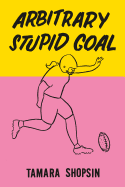
| Publisher: | MCD/Farrar, Straus & Giroux | |
| Genre: | Biography & Autobiography, Women, United States, Culinary, Artists, Architects, Photographers, History, State & Local - Middle Atlantic | |
| ISBN: | 9780374105860 | |
| Pub Date: | July 2017 | |
| Price: | $27 |
| Biography & Memoir |
by Tamara Shopsin
Writer, graphic artist and restaurant cook Tamara Shopsin (Mumbai New York Scranton) grew up in her parents' Greenwich Village store and restaurant in the 1970s, when the area was dirty and sketchy and still felt like a village. Arbitrary Stupid Goal is a memoir of her loving erratic family of "foul-mouthed dirt balls," their restaurant, customers, neighbors and friends.
Shopsin was raised to believe "the nutrients of New York City are in the fringe people." Many of those she grew up around were scraping by as building supers and scam artists, musicians and home bakers. Jeff Goldblum, Joseph Brodsky, Charlie Parker, John Belushi and Calvin Trillin also have cameos. Shopsin and her four siblings roamed the city and had free rein of the restaurant, playing and working there, getting gifts and homework help from customers. The central figures are her volatile father and his good friend Willy, a scam artist, singer and obsessive Casanova who unchained the garbage can lids when it snowed so the Shopsin kids could use them as sleds. He also "liked running with dangerous people but had a theory he lived by: Don't sit next to people like that. Someone might come to shoot them, miss, and get you instead."
Shopsin's style is lucid and anecdotal, and the quantity of her stories and subjects nearly overwhelming. Thankfully, her frequent spaces and page breaks slow the reader enough to absorb her "ecstasy in the small things, the unexpected, and the everyday." --Sara Catterall
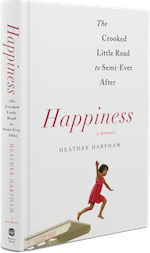
| Publisher: | Holt | |
| Genre: | Biography & Autobiography, Women, Personal Memoirs, Literary | |
| ISBN: | 9781250131560 | |
| Pub Date: | August 2017 | |
| Price: | $27 |
| Biography & Memoir |
by Heather Harpham
In her debut memoir, Happiness: The Crooked Little Road to Semi-Ever After, award-winning playwright and performance artist Heather Harpham's first precious moments of happiness with her newborn are shattered when she learns her daughter has a rare blood condition that places her at high risk for brain damage or death.
Along with the scary medical issues come additional complications. Harpham must navigate this crisis mostly alone, living in her mother's converted garage in California. Her daughter's father, Brian--whom Harpham loves deeply--had made it clear early on their relationship that he didn't want children. When she announces the unplanned pregnancy, Brian wrestles with his love for Harpham versus the undeniable fact that he does not want a family. Ultimately, he remains in New York to pursue his career as a teacher and an award-winning, published novelist--a decision that Harpham understands, even if it breaks her heart.
"If a baby is the unfathomable concoction of two people, what happens when one of those two, upon discovering a baby is under way, changes his mind? I was physiologically bewildered; carrying around, in my body, the genetic material of someone who had said no to fatherhood. Meanwhile his genes and my genes were sketching the blueprint of a person. If I was constructing a human out of a reluctant set of building blocks, with genes that lay themselves out with reservation and regret, in sequential order, step by step, but under duress, what then?"
"What then" soon becomes a series of life-saving blood transfusions and countless hospital stays for baby Gracie. As Harpham becomes adept in caring for her medically fragile daughter, she realizes how much forgiveness and acceptance are necessary for her and Gracie's future. Gradually, Brian's role in their lives shifts into something new and unexpected when he can no longer deny his need to care for those he loves.
Harpham writes: "Trying to make a family is a gamble, and if I was going to bet on something, I would bet on what I wanted, what I hoped for, what I believed in.... It was a leap of faith and I was already midair."
Harpham's ability to capture an audience's emotions takes center stage as a memoirist. Her deeply personal yet witty narrative style makes the reader feel instantly connected, as if Harpham is a close friend traveling a familiar "crooked little road to semi-ever after." Hers is a journey evoking a spectrum of emotions: hope, sadness, anger and, yes, happiness.
Within the first few pages of Happiness, Harpham immediately grabs for the heart, juxtaposing the roller-coaster reality of caring for a critically ill newborn alongside her exhilarating, romantic courtship with Brian. She recalls a prescient conversation at an intimate Greenwich Village restaurant, "the kind of place where, to reach your table, you're obliged to wedge sideways and apologize to strangers whom you've brushed with your hips."
"Seated, we leaned over the small table to breathe the same air and figure each other out. He said he'd read recently that everyone has a personal 'happiness quotient,' that your happiness in life is essentially set, regardless of circumstances. He reckoned his was low, and guessed mine was high. I'd never heard of a happiness quotient. I'd never stopped to consider happiness as anything other than an assumed default state, a place to return to after the occasional thick fog."
Like the weather in Harpham's native San Francisco, such a fog would engulf the couple in confusion and uncertainty on numerous occasions. None would be more significant than when Gracie turns three and her condition becomes dire enough to require a bone marrow transplant. For Harpham, who by then had moved back to New York, the prospect of leaving their beloved, supportive Brooklyn community--close friends and strangers alike who donated more than $85,000 for Gracie's care--for an uncertain, extended hospital stay at Duke University seems daunting, especially without a lifetime guarantee.
"Transplant can cure you. Or it can kill you. There's not much middle ground. [Choosing transplant] would be, as one doctor put it, taking our 'risk upfront.' If only she were a hedge fund, or an annuity, it would be easy to take our risk upfront. But she was a girl. A single, unique, irreplaceable girl."
Though Gracie survives and thrives, experiencing the heartbreak and precarious perspective of a parent whose child is a pediatric transplant patient provides Harpham with an even greater understanding of her own happiness quotient, and her capacity for risk and love. That insight, one grounded in gratitude, is shared in Happiness without saccharine platitudes or foregone conclusions but with a refreshing, pragmatic realism: joy and contentment are often uncertain, nebulous, elusive and, eventually, self-defined. --Melissa Firman
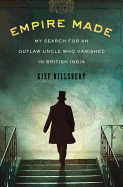
| Publisher: | Houghton Mifflin Harcourt | |
| Genre: | Gay Studies, India & South Asia, Great Britain - General, Travel, Asia, Europe, Essays & Travelogues, History, Social Science, LGBT Studies | |
| ISBN: | 9780547443317 | |
| Pub Date: | July 2017 | |
| Price: | $25 |
| History |
by Kief Hillsbery
Kief Hillsbery grew up with the legend of his great-grandfather's great-uncle Nigel, who had "gone out to India" and never returned to his family's home in Coventry, England. According to the many stories, he'd left the British East India Company abruptly and gone to live in Kathmandu; he'd been killed by a tiger; he'd been involved with shady dealings regarding a famous diamond. From childhood, Hillsbery always had "a clear sense that [the family] disapproved of Nigel and the vague notion that there was more to his story."
In Empire Made: My Search for an Outlaw Uncle Who Vanished in British India, Hillsbery describes his decades-long, on-and-off exploration into Nigel's life and death. It is an absorbing story, told with an eye for suspense and the odd, engrossing detail. Alternating chapters follow the author's own travels and Nigel's, the latter re-created using personal correspondence and official records from the 1840s. Necessarily, Empire Made also delves into British and Indian politics, and the nuanced racial and class-based prejudices and pressures that characterized the British East India Company for centuries. The background history that contextualizes this story can be convoluted, but Hillsbery wrestles this "historical quicksand" gamely, and his digressions enrich the sense of strange wonderment that characterizes this investigation. In the end, this epic story of travel, research, family mystery and centuries-long colonial effort ends with uncertainty; but Hillsbery's voice in closing does find satisfaction in what he's learned. --Julia Jenkins
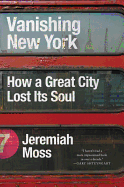
| Publisher: | Dey Street Books | |
| Genre: | Urban, Public Policy, City Planning & Urban Development, Sociology, Social Policy, Social Science, Political Science | |
| ISBN: | 9780062439697 | |
| Pub Date: | July 2017 | |
| Price: | $28.99 |
| Starred | Social Science |
by Jeremiah Moss
A proudly cranky Massachusetts transplant, Jeremiah Moss came to New York City in the early '90s hoping to find a little of the punk edginess of the '70s and '80s or even the freewheeling Beat cool of the '50s and '60s. Instead, he watched the East Village gentrify into a trendy suburbia where "pastrami and chopped liver would be replaced by Buffalo hot wings and cheese sticks." Vanishing New York is a collection of his blogs tracing the "hypergentrification" of the city once home to the dreams of the rebel young, the "poets, punks, and queers, activists and anarchists, dominatrices and drug addicts, graffitists, nudists, and underground cartoonists." True to his pen name, his blogs are a jeremiad against city planners (e.g., Robert Moses), mayors (e.g., Michael Bloomberg) and developers (e.g., Donald Trump) who bulldozed, rezoned and condo-ized the Jane Jacobs city of neighborhood blocks and storefronts into one of "cupcakes, cronuts, and hundred-dollar doughnuts dipped in 24-karat gold."
Working neighborhood by neighborhood, Moss writes like a war correspondent tallying battle casualties: the Village, the Bowery, the Meatpacking District, Chelsea, the Hudson Yards, Harlem and Brooklyn. He leans to feet-on-the-street observations, but also digs into the history of the powerful who oversaw and engineered the city's downfall--especially his nemesis Bloomberg. Moss quotes the Daily News on the 10th anniversary of 9/11: "Our city suffered two tragedies a decade ago: the 9/11 attacks and the election of Mayor Bloomberg. The former tried to destroy New York City; the latter succeeded." Vanishing New York is an entertainment as much as it is a polemic. Angry--sure. Funny--you bet. And oh so astute. --Bruce Jacobs, founding partner, Watermark Books & Cafe, Wichita, Kan.
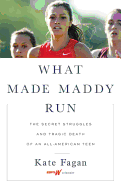
| Publisher: | Little, Brown | |
| Genre: | Psychology, Mental Health, Medical, Suicide | |
| ISBN: | 9780316356541 | |
| Pub Date: | August 2017 | |
| Price: | $27 |
| Starred | Psychology & Self-Help |
by Kate Fagan
What began as "Split Image," a profile piece for ESPN by columnist and feature writer Kate Fagan (The Reappearing Act), swelled into a heartbreaking exploration of mental health in college sports during the era of social media. Madison Holleran was a 19-year-old freshman University of Pennsylvania track recruit whose depression resulted in her suicide in January 2014. As she wrote about Maddy, Fagan heard from many others like her--young athletes struggling with depression or anxiety. Fagan cites the NCAA as saying, "suicide is the third-leading cause of death among student-athletes--behind accidents and cardiac causes." The overwhelming prevalence of mental health issues among these young people inspired Fagan to expand "Split Image" into What Made Maddy Run.
Fagan depicts the Maddy Holleran her friends and family knew, a smart, beautiful, talented, successful young woman. In high school, she excelled at soccer and track, the latter being the sport that opened doors to an Ivy League college. Through Maddy's text messages, personal writings and relationships with those around her, Fagan illustrates how college turned out to be the trigger for her depression.
Entwined with Maddy's story is Fagan's: her own experience with anxiety and having a panic attack; the state of college athletic programs--Fagan played college basketball at Colorado University; and her research and efforts to connect with other college-level competitors. With immense empathy, she shares insights particular to student athletes, but presents them in universally accessible language and connects with the non-athlete through vivid examples.
Maddy Holleran's story is tragic, but not rare. Fagan demonstrates with sensitivity and compassion the urgent need to understand and address a deadly problem. --Jen Forbus, freelancer
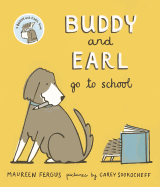
| Publisher: | Groundwood Books | |
| Genre: | Friendship, Pets, Animals, School & Education, Social Themes, Juvenile Fiction | |
| ISBN: | 9781554989270 | |
| Pub Date: | August 2017 | |
| Price: | $16.95 |
| Starred | Children's & Young Adult |
by Maureen Fergus, illust. by Carey Sookocheff
In Buddy and Earl's fourth outing, Maureen Fergus and Carey Sookocheff (Buddy and Earl and the Great Big Baby) send the hilarious dog and hedgehog duo to school, where their friendship goes to the head of the class.
"With the right education, I can become anything," says imaginative hedgehog Earl when Meredith, the pair's human girl, tells them they're going to school. He hopes to learn dentistry, while his earnestly doofy canine friend Buddy's career aspirations include hot dog vendor and fire hydrant--until he remembers what dogs do to fire hydrants, that is. In the make-believe classroom, Earl's excitement quickly shifts to boredom, until Meredith steps out and puts him in charge. When newly minted Professor Earl introduces a curriculum that emphasizes "Sniffing Things," "Tail Chasing" and "Scratching Itches," Buddy unsurprisingly earns high marks, playing innocently into Earl's ultimate goal of honoring his best friend.
Despite Earl's flair for drama, the two besties remain refreshingly conflict-free in this gentle celebration of friendship and imagination. Sookocheff's muted palette of gray, brown and buttery yellow keeps the tone soft and dreamy as Earl's fantasy slowly takes over and Meredith's dolls go from objects to an audience cheering for Buddy. Parents will appreciate the implication that school brings positive experiences; young readers will crack up at Fergus's silly humor, such as the pals eating a "nutritious breakfast" of Dad's slippers, which Buddy admits do not taste as nice as Dad's "fancy shoes." This series continues to earn straight A's. --Jaclyn Fulwood, youth services manager at Main Branch, Dayton Metro Library
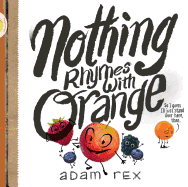
| Publisher: | Chronicle | |
| Genre: | Concepts, Humorous Stories, Words, Social Themes, Self-Esteem & Self-Reliance, Juvenile Fiction | |
| ISBN: | 9781452154435 | |
| Pub Date: | August 2017 | |
| Price: | $16.99 |
| Children's & Young Adult |
by Adam Rex
With big smiles plastered on their faces, an apple and a pear invite the reader into Adam Rex's (School's First Day of School) Nothing Rhymes with Orange, asking who "wouldn't travel anywhere/ to get an apple or a pear?" More happy, anthropomorphized fruits join in on the fun: a banana surfs by, waving at a plum and a Speedo-clad peach. "Hey, are you guys going to need me for this book?" asks the orange from the corner of the page, "[j]ust wanted you to know I'm available in case something comes up."
Knowing full well that nothing rhymes with him, the orange sulks as the pages become more and more packed. A "lychee" joins the cast, rhyming with "peachy" and, eventually, "Friedrich Nietzsche" ("FRUCHT!"). The rhyme scheme stretches, becoming ever more forced in an attempt to fit in all the fruit: "If a pear gets lost at night/ and meets a wolf, who takes a bite,/ then does that pear become a pearwolf when the moon is full and bright?"
At this point, the orange has had it ("This book's sorta gone off the rails. I'm glad I'm not a part of it."). But when a grape in a cape flies by and ties the pearwolf to a chair, the morose orange moans, "Oh, who am I kidding... this book is amazing." Rex's photo collage illustrations are bold and silly, all the fruits bursting with personality. The orange is a sympathetic character, and the illustration of his eventual inclusion is an ending readers are sure to visit time and again. Whether read aloud or solo, the bright illustrations, funny rhymes and happy ending make this a thoroughly enjoyable story. --Siân Gaetano, children's and YA editor, Shelf Awareness